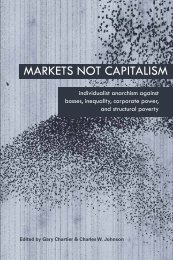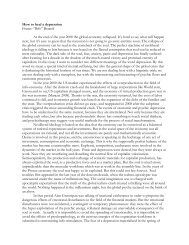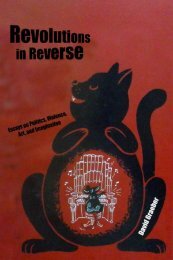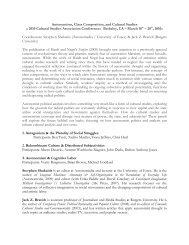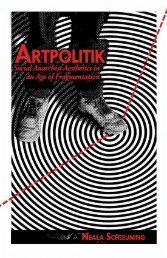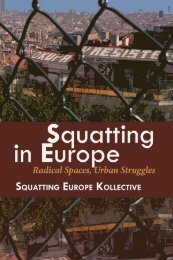nanopolitics handbook - Minor Compositions
nanopolitics handbook - Minor Compositions
nanopolitics handbook - Minor Compositions
You also want an ePaper? Increase the reach of your titles
YUMPU automatically turns print PDFs into web optimized ePapers that Google loves.
untouchable to the ‘public’, and impoverished ‘zones’ that sprawl both withinand far out of the centre. We share ongoing experiences of crass gentrificationacross our homes and workplaces, moving along the margins of zone two,ever more pushed towards the suburbs because of rising rents and the everydaymore unreachable possibility of ever owning a shelter to call home.There are about 7.5 million people on 1583 square kilometres here, 12million in the metropolitan area. What does this number mean to our bodies,our relationships, our politics? London is not just marginal to our sharedconcerns and experience, but constitutes a key part of them: the long distanceswe travel just to have a short meeting or coffee make us protective of ourtime, exhausted from constant movement, and the price of transport weighsus down, or keeps us home. On bicycles, we escape the time and money drainof London a bit, but our bodies feel the stress of traffic and the exhaustion ofdistances all the more: rain and wind often add to that. The metropolis is abodily condition in so many ways: it’s a noisy and speedy city before our eyes,ears and muscles – we go to sleep with tense jaws, tired legs and eyes.Real estate speculation and neoliberal urban policies make the city a permanentconstruction site. Cranes devour familiar landscapes at vertiginousspeed, familiar shops shut down and are replaced at regular intervals, skyscrapersgrow to the skies, shopping centres and Olympic sites rise from theground, demolishing and displacing the ‘old’ city on their ascent to emptyglobal urban iconicity. The city reloads itself constantly, in tune with capital.We tire of aggressive change, not least because it drives us out of our neighbourhoods,poor and trashy but beloved. We try to engage locally with ourpolitics, and hold our meetings at easily reachable and friendly sites, since iteasily takes an hour to get anywhere London, but this is difficult since we’reall spread across vast distances north and south of the river. What does resistancemean in the face of these conditions of urban life?In our journeys we often have to traverse the City of London: a block ofglossy, impenetrable concrete and glass buildings with luxury shops in between,full of people with black suits and blackberries. This is one of the monstroushearts of global finance, these are the people earning the public moneythat was used to save the banks: the Occupy movement bravely put itself rightthere, in the belly of this most hostile and disturbing part of London. We tryto invade and inhabit this territory many times, in demonstrations and protests,but apart from fleeting moments, and the warmth of the company andfree tea at the occupy camps, a feeling of chill and disempowerment remainsevery time. This feeling also persists in central London, and increasingly inour own areas, where public space and services shrink or disappear underincreasing privatisation and ‘austerity’ measures, where benches and quiet30



